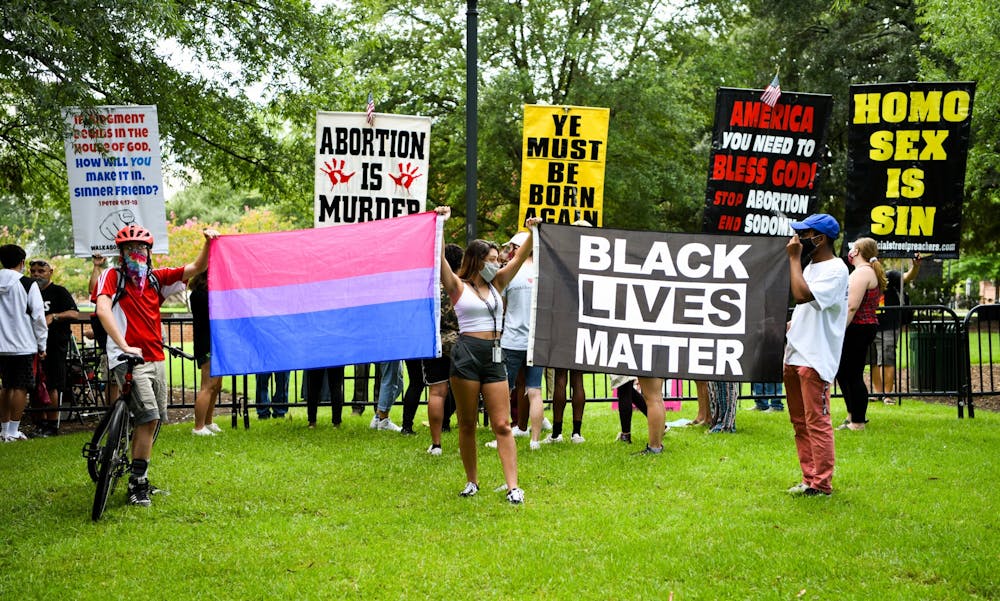Editor's note: Protesters quoted in this column use language that might be triggering to some readers.
This week’s protest on campus taught us two things: Bigotry is alive and well, and the university has allowed it to take root on our campus.
It’s in our creed: “I will discourage bigotry, while striving to learn from differences in people, ideas and opinions.” It appears that the USC administration and I have a difference in opinion. Per our creed, here’s what I have learned.
The university’s calculated, politically correct statements about bigotry on our campus this Wednesday did not seek to evaluate campus policy or hold itself accountable for its complicity in passively perpetuating racist, homophobic and sexist ideologies.

Earlier this week, protesters held signs with language such as “homo sex is sin” and stood on Davis Field calling students “w—s” and racial slurs.
Raina Wigfall, a first-year media arts student, said one of the demonstrators called black people “monkeys.” She said she chose to engage with them because, as an African American, their opinions personally affected her.
Christian Fredericks, a first-year political science and environmental studies student, qualified the language of the protesters as hate speech.
“They’ve said every slur in the book, really demeaned every single group except white, Christian old men with Trump hats,” Fredericks said.
The demonstrators themselves claimed to act out of love.
One protester refused to give his name, claiming to solely speak in "the name of Jesus Christ."
“We heard a rumor that there's homosexuals and w—s on the campus, and we weren’t sure about it, but when we showed up and started sharing the love of Jesus, it became obvious that, yeah, there’s several of them,” he said.
John Williams, an evangelist from Cincinnati, Ohio, said they were there "to uplift the name of Jesus Christ" and provided the organization’s website, officialstreetpreachers.com.
“There’s a lot of sin on this campus. Sexual assault and rape has increased — has doubled since 2015 on this campus, so we’re just trying to make the campus aware of the dangers of living in sinful lives,” Williams said.
Williams said a similar demonstration last week got a “good response” and encouraged them to return.
Whether or not the demonstrators simply aimed to get a rise out of students is beside the point.
In response to the protests, President Bob Caslen tweeted that he shared students’ “frustration” with the demonstrators.
“Frustration” is appropriate language to describe long Russell House lines and backlogged bookstore orders. Not student harassment.
In a message this summer, President Caslen wrote that “hateful rhetoric” did not reflect USC values. In another message, he wrote that “action matters more than words alone.” Caslen failed to implement these promises in a moment that needed decisive leadership.
The protesters had to reserve a space through Russell House. According to university policy, organizations and visitors are expected to “respect the rights of others, and abide by all general laws and University policies.”
The clear disregard for human rights defies this standard and so, per USC’s own language, should have subjected the demonstrators to disciplinary action. These protests were not a matter of constitutional rights, but university regulations.
Telling students that ignoring language that is inherently hateful, as Student Body President Issy Rushton did, contends that passivity towards bigotry yields positive results.
As Carolinians, we made a promise to discourage bigotry, not ignore it. There are established policies to prevent these kinds of disruptive and damaging exhibitions from happening.
The university chose to let it happen anyway.
This isn’t a practice in civics, this is about the well-being of the students. The written and established rules gave USC justifiable reason to remove these protesters.
USC instead proved that it will capitulate under threats and ignore the needs of its students.
On Friday, President Caslen denounced the protesters and said that they would examine options to find the correct and legal ways to protect free speech while maintaining campus culture.
While preventative actions and legal evaluations are necessary, the protests should have been stopped as soon as the demonstrators began blatantly disrespecting the rights of students.
In moments of crisis, USC students need an administration who will not hesitate to defend them against abuse. USC, we have faith that you can do better.

